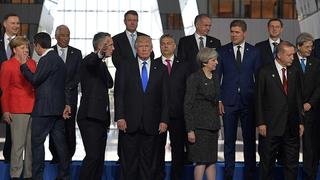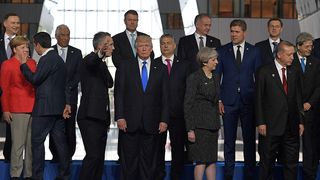It was the perfect visual metaphor for the decline of American leadership: at the G7 meeting in Sicily, six leaders strolled together through the coastal Italian town, while Donald Trump trailed behind in a golf cart. Even setting aside Trump's preference for golf over governing, his self-isolation from other liberal democracies reflected the new standard he is creating, in foreign and domestic policy: a policy of America in absentia.
Over the past few weeks, Trump has reinforced that absence again and again. There was the NATO summit, where Trump refused to restate America's commitment to Article 5, the treaty's collective-defense provision. That restatement is not just a matter of tradition. Trump's heated criticisms of NATO have thrown into doubt America's commitment to the alliance at a critical time. An expansionist Russia has been eyeing the Baltic states, which are NATO members; the absence of a strong American commitment to their defence leaves them exposed and vulnerable.

Likewise, Trump's decision to pull out of the Paris climate accords. The withdrawal from Paris was, at heart, a withdrawal from the global community, a statement of Trump's disdain for even a symbolic commitment to common goals and shared efforts. After all, his executive orders on environmental regulation had already undone the Paris commitments made by President Obama. In that context, publicly withdrawing the US from the accords was a matter of symbolism, another show of self-isolation.
Even the terrorist attack in London this weekend reinforced the new American absence. After Trump made a number of opportunistic and offensive statements on Twitter – using the attacks to renew calls for his travel ban, misquoting and deriding the mayor of London – London mayor Sadiq Khan responded with the equivalent of an eye roll. A staffer released a statement that said the mayor had more important things to do than respond to the President's "ill-informed tweet".
That absence of American leadership is not just an issue abroad, however. At home there is also a leadership vacuum caused by a White House fuelled by ignorance and indifference.
Four months into Trump's presidency, leaders are already learning to ignore his words, increasingly treating them as irrelevant distractions.
That absence of American leadership is not just an issue abroad, however. At home there is also a leadership vacuum caused by a White House fuelled by ignorance and indifference.
Four months in, the administration remains cripplingly understaffed. The White House has yet to even nominate anyone to 80 per cent of key confirmation positions. Cabinet secretaries lack any support staff. There are almost no science advisers on staff. No one is in charge of the Center for Disease Control, where a hiring freeze has left 700 positions unfilled.
Nor, at the start of hurricane season, has anyone been appointed to lead the Federal Emergency Management Agency. Which, by the way, is also part of the Department of Homeland Security, and an integral part of the national response in the event of an attack. No one's directing the FBI right now, either, despite Trump's promise to appoint a new head before leaving on his first major trip two weeks ago.
Meanwhile, the major legislative goals of the administration have been hampered by an absence of staffing, knowledge, and engagement. The most visible failure has been the American Health Care Act. The first time out, the administration failed to win support for the legislation because they didn't understand the politics. The second time out, they managed to whip the votes to pass a House bill that the American people almost universally despise.
Currently just eight per cent of Americans think the Senate should pass the House bill.
The absences have been less visible but more powerful in shaping the administration's other main goal, tax reform. In his speech announcing America's withdrawal from the Paris accords, Trump crowed about his tax reform legislation: "Our tax bill is moving along in Congress, and I believe it's doing very well."
Only one problem: there is no tax bill. In fact, while the administration promised a detailed plan for Republicans in Congress to base their legislation on, so far they have submitted only a one-page description of what tax reform might look like. One page for overhauling the entire US tax code. If anything, the single-sided sheet of paper served to highlight how little the administration has to offer.
Again and again, Trump promises efficiency and delivers, at most, excuses.
There's one another absence worth mentioning, one that hasn't been highlighted nearly as much as it should have been. In the wake of a brutal terror attack in Portland, Oregon, in which two people were killed and one badly wounded, including an Iraq War vet, the President was missing in action. He didn't break his silence for three days, and when he did, it was with a tepid tweet from the official presidential account rather than Trump's personal (and much more widely followed) one.
Trump, who rushes to respond when there is the remotest possibility of a terror attack committed by an Islamic attacker, stayed quiet when the attacker was a white nationalist harassing two Muslim girls in Oregon. It was an absence keenly felt by victims of racist terror, another sign that the Trump presidency will come to be defined, at home and abroad, by the gaping holes it leaves behind.






